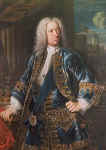Georg II. August, elector of Hanover and king of Great Britain, the only son of Georg I. Ludwig (1660-1727) and Sophie Dorothea (1666-1726), Princess of Brunswick - Lüneburg - Celle. From the time of his parents divorce in 1694, Georg August was raised without a mother. Throughout his life, he stood in opposition to his father.
In 1708 the then electoral Prince of Hanover married Princess Wilhelmine Caroline (1683-1737) of Brandenburg - Ansbach, and in 1706 he was created earl of Cambridge. After his accession to the throne in London in 1727, king George II. visited his Electorate twelve times. The stays were marked by hunting, military reviews, trips through the mother country, diplomacy, and appearances at the court. His prime minister in Hanover, Gerlach Adolph von Muüchhausen, stood at the apex of Hanoverian rule. In 1737 he was the sole founder and curator of the university in Göttingen named after the king, "Georgia Augusta." George II fought in the War of the Spanish Succession and during the invasion of Charles Edward Stuart (the Young Pretender) and his Jacobite followers in 1745. In the War of the Austrian Succession he maintained neutrality, but he supplied Hanoverian troops, at English pay, for the "pragmatic army," with which he defeated the French at Dettingen am Main. English policy was directed by his influential ministers: Walpole, Carteret, Pelham, and, ultimately, Pitt the Elder (1708-1778). Tensions in the English parliament persistently arose whenever there was suspicion that English policy was made in the service of Hanoverian interests.
Although king George II. also had a mistress, his marriage with Caroline was happy. After his death George II. left behind seven children and an illegitimate son, who later became General Major and art collector, Johann Ludwig Graf von Wallmoden-Gimborn.
--Adapted from the website, Die Welfen
![]()
Sources
- Encyclopedia Britannica, 13th edition. New York: The Encyclopædia Britannica, Inc., 1926.
- Heil unserm König. Historisches Museum. Hanover, 1995.
Web






